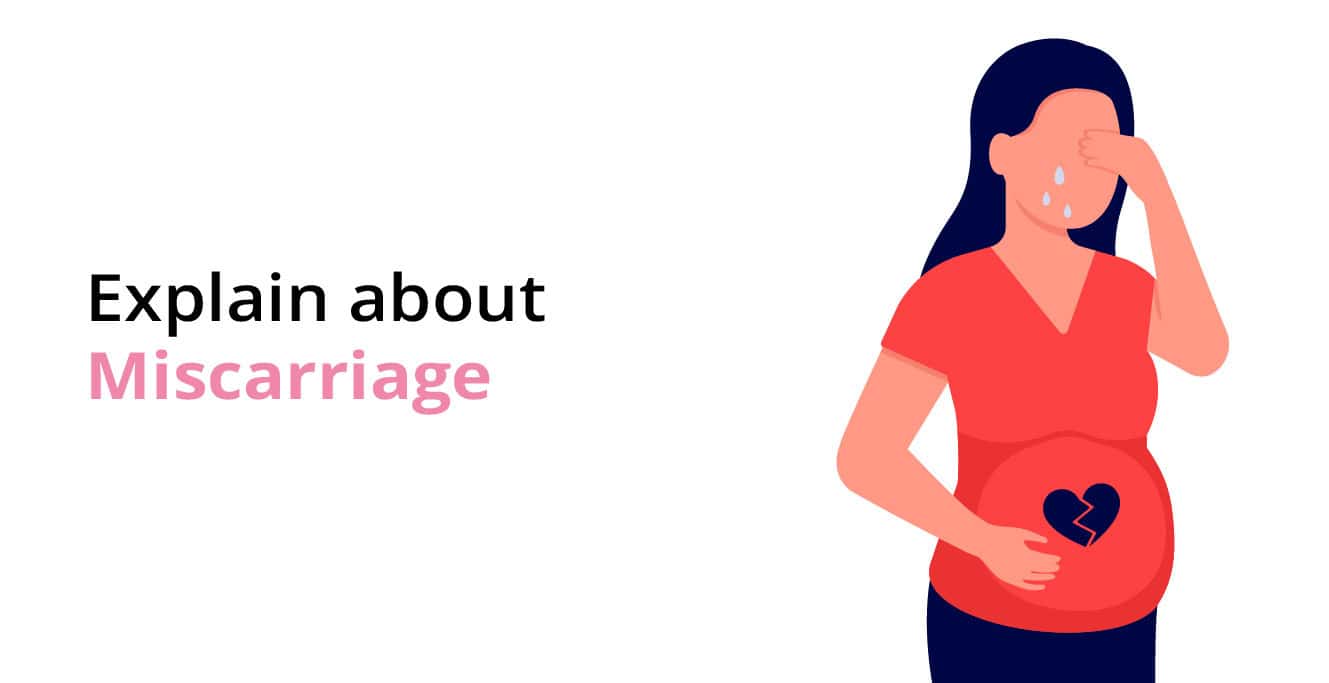
Recurrent Miscarriage Causes, Diagnosis & its Treatment

Table of Contents
A recurrent miscarriage is when a woman has two or more pregnancy losses in a row. This is a very traumatic experience for any couple and typically takes a toll on their mental and physical health.
Hence, this article covers the risk factors, causes, and treatments for recurrent miscarriages.
Recurrent miscarriage causes
According to an estimate, 15-25% of pregnancies in India result in miscarriages. Now, that’s a significant number that cannot and should not be ignored. Your treatment depends on the specific problem that’s causing the multiple pregnancy losses. This section explores the various reasons for recurrent miscarriages.
Genetic cause
A common cause of recurrent miscarriages is a genetic abnormality. Chromosomal abnormalities in the early stages of embryo development can lead to loss of pregnancy.
These abnormalities are entirely random and are responsible for half of the first-trimester recurrent miscarriages. Many women go on to have a successful third pregnancy after suffering two consecutive losses, often without treatment.
However, if you have suffered three or more recurrent miscarriages, doctors may look into your, i.e. parents’ genes. It so happens that either of the parents may have something called a balanced translocation.
In this condition, part of a chromosome breaks off and attaches itself to another chromosome. The parent may not feel any symptoms at all. However, during embryo development, the child may receive either excess chromosomes or miss certain chromosomes, which ultimately leads to pregnancy loss.
Blood clotting disorder
Antiphospholipid syndrome (APS) is a condition that can lead to blood clots and strokes. It’s an autoimmune disorder that causes the body to produce abnormal antibodies that attack the blood cells and their coating, called the phospholipid.
Blood cells require phospholipids to function correctly. When the antibodies attack the phospholipids, the cells get clogged and can’t move through the blood vessels to their destination. Blood clots form as a result.
This rare autoimmune disorder can cause recurrent miscarriages because the clots may disrupt the blood flow to the placenta. As a result, the fetus gets deprived of essential nutrients and oxygen, resulting in pregnancy loss.
Uterine problems
The uterus is the female reproductive organ located in the pelvic cavity. This organ is responsible for the menstrual cycle, pregnancy, and childbirth.
Listed below are the most common uterine problems that can cause recurrent miscarriages:
- Bicornuate uterus: It is a rare form of uterine malformation in which a tissue called the septum divides the uterus into two cavities.
- Asherman syndrome: The formation of scar tissue in the uterus is called Asherman syndrome. It can be caused due to an injury or previous surgery.
- Fibroids: They are benign tumours located in the uterus. Fibroids can cause heavy bleeding, pain, and other symptoms.
Hormonal disorders
The reasons for recurrent miscarriage may also be hormonal disorders, such as:
- Hyperthyroidism (excess thyroid hormone)
- Hypothyroidism (deficiency of thyroid hormone)
- Uncontrolled diabetes
- Polycystic ovary syndrome or PCOS (estrogen imbalance)
- Excess prolactin levels (a hormone secreted by the pituitary gland)
Other causes
Age is another factor that can contribute to recurrent miscarriages. The risk is higher in women over the age of 35 and men over the age of 40.
Certain lifestyle factors such as smoking (first-hand or passive), excess consumption of caffeine or alcohol, and obesity are also risk factors for pregnancy loss. It’s never too late to seek help and change your lifestyle for the better.
Diagnosis
To identify the recurrent miscarriage cause, your doctors will likely order the following tests:
Karyotyping
To detect chromosomal abnormalities in parents, doctors may order genetic screening of both parents to determine their configuration of chromosomes. This is known as karyotyping.
Blood tests
These are ordered to identify the presence of antiphospholipid antibodies. Doctors also prescribe blood work to check the level of thyroid hormone and blood glucose.
Imaging techniques
If doctors suspect that a uterine problem is causing recurrent miscarriages in your case, they may recommend imaging tests such as ultrasound, magnetic resonance imaging (MRI), X-ray, etc.
Hysteroscopy
It is a procedure used to examine the inside of the uterus. Hysteroscopy is most commonly used to diagnose menstrual disorders, uterine fibroids, and endometrial cancer. The procedure involves the insertion of a small camera through the cervix and into the uterus. The camera sends images to a monitor where they can be viewed in real-time.
Recurrent miscarriage treatment options
Based on your diagnosis, doctors may recommend any of the following treatment options:
Blood thinners
If you are diagnosed with APS, doctors may prescribe blood thinning medication to improve your chances of having a successful pregnancy. However, you must never self-medicate on blood thinners as it may lead to serious bleeding problems.
In Vitro Fertilization (IVF)
This treatment method is recommended if balanced translocation is found in either of the parents. Using the IVF technique, doctors fertilize multiple eggs in the laboratory and identify the ones unaffected. The healthy embryo is then implanted into the uterus.
Surgery
If you have been diagnosed with a uterine problem, doctors may advise surgery to remove the scar tissue (adhesiolysis) and fibroids or treat the bicornuate uterus (metroplasty).
Medicines
Other recurrent miscarriage causes, such as thyroid disorders and diabetes, are usually treated with medications.
However, note that high blood sugar can lead to pregnancy complications, such as congenital disabilities and stillbirth, or cause you to stop ovulating completely. In that case, also, doctors will likely advise looking into fertility options like IVF.
Conclusion
It’s a heart-wrenching experience to go through recurrent miscarriages, but it can happen.
There are many causes of recurrent miscarriages, including chromosomal abnormalities, Antiphospholipid syndrome, uterine problems, hormonal disorders, age, and lifestyle factors such as smoking and drinking too much alcohol.
Depending on what’s causing the issue in your case, you may be prescribed medicines, in vitro fertilization (IVF), surgery, or blood thinners. To get the best diagnosis and treatment for recurrent miscarriages and infertility, visit Birla Fertility & IVF or book an appointment with Dr. Deepika Mishra.
FAQs
1. What should I do if I have recurrent miscarriages?
If you are experiencing recurrent miscarriages, it is important to see your doctor. There are many reasons for recurrent miscarriages, and it is important to find the root cause of the issue.
2. Are recurrent miscarriages considered infertility?
One or two miscarriages don’t always indicate infertility. However, your chances of conceiving decrease after each miscarriage. Even after the third miscarriage, you have a 70% chance of having a successful pregnancy.
It’s crucial to consult a doctor to understand your condition and determine your future course of action.
3. What is the most common reason for recurrent miscarriage?
Random or inherited chromosomal abnormality is the most common recurrent miscarriage cause. The former is not a medical condition and is entirely based on chance. The latter can be diagnosed, and you can get pregnant via IVF.
Our Fertility Specialists
Related Blogs
To know more
Birla Fertility & IVF aims at transforming the future of fertility globally, through outstanding clinical outcomes, research, innovation and compassionate care.
Had an IVF Failure?
Talk to our fertility experts

 Our Centers
Our Centers
















